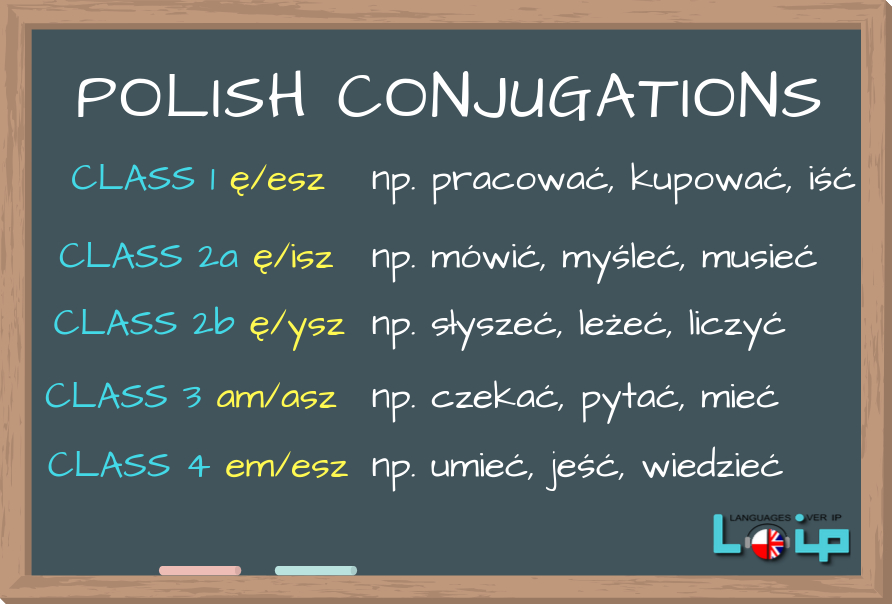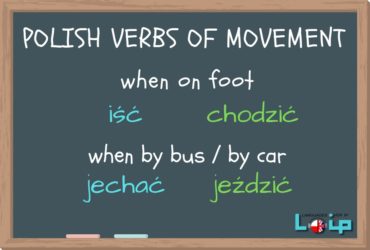Polish verbs can be classified into 4 main classes (conjugations).
I would advise you to learn, for each infinitive, what the 1st person singular and 2nd person singular forms are. The other forms of the present tense may be predicted from these two forms.
Here are the four classes (conjugations) of verbs.
Class I (the ę/esz conjugation)
Here we have such verbs as:
pracować – to work (1st person pracuję || 2nd person pracujesz)
interesować się – to be interested in (1st person interesuję się || 2nd person interesujesz się)
kupować – to buy (1st person kupuję || 2nd person kupujesz)
podróżować – to travel (1st person podróżuję || 2nd person podróżujesz)
pisać – to write (1st person piszę || 2nd person piszesz)
pić – to drink (1st person piję || 2nd person pijesz)
chcieć – to want (1st person chcę || 2nd person chcesz)
iść – to go on foot (1st person idę || 2nd person idziesz) * oni idą
móc – can (be able to) (1st person mogę || 2nd person możesz) * oni mogą
brać – to take ( 1st person birę || 2nd person bierzesz) * oni biorą
* NOTE: If there is a change in the stem between the 1st person (JA) and the 2nd person (TY), then the 3rd person plural (ONI / ONE) will have the same stem as the 1st person singular.
You can practise the endings of the ę/esz conjugation here: the ę/esz conjugation exercise
Class II a (the ę / isz conjugation)
Here we have such verbs as:
lubić – to like (1st person lubię || 2nd person lubisz)
mówić – to speak (1st person mówię || 2nd person mówisz)
dzwonić – to ring (1st person dzwonię || 2nd person dzwonisz)
robić – to make (1st person robię || 2nd person robisz)
spać – to sleep (1st person śpię || 2nd person śpisz)
bawić się – to have fun (1st person bawię się || 2nd person bawisz się)
myśleć – to think (1st person myślę || 2nd person myślisz)
musieć – have to (1st person muszę || 2nd person musisz) * oni muszą
* NOTE: If there is a change in the stem between the 1st person (JA) and the 2nd person (TY), then the 3rd person plural (ONI / ONE) will have the same stem as the 1st person singular.
You can practise the endings of the ę/isz conjugation here: the ę/isz cojugation exercise
Class II b (the ę/ysz conjugation)
Here we have such verbs as:
słyszeć – to hear (1st person słyszę || 2nd person słyszysz)
leżeć – to lie (1st person leżę || 2nd person leżysz)
liczyć – to count (1st person liczę || 2nd person liczysz)
You can practise the endings of the ę/ysz conjugation here: the ę/ysz conjugation exercise
Class III (the am/asz conjugation)
Here we have such verbs as:
czekać – to wait (1st person czekam || 2nd person czekasz)
kochać – to love (1st person kocham || 2nd person kochasz)
czytać – to read (1st person czytam || 2nd person czytasz)
śpiewać – to sing (1st person śpiewam || 2nd person śpiewasz)
pytać – to ask (1st person pytam || 2nd person pytasz)
biegać – to run (1st person biegam || 2nd person biegasz)
grać – to play (1st person gram || 2nd person grasz)
pływać – to swim (1st person pływam || 2nd person pływasz)
pamiętać – to remember (1st person pamiętam || 2nd person pamiętasz)
sprzątać – to tidy up (1st person sprzątam || 2nd person sprzątasz)
oglądać – to watch (1st person oglądam || 2nd person oglądasz)
mieć – to have ( 1st person mam || 2nd person masz)
You can practise the endings of the am/asz conjugation here: the am/asz conjugation exercise
Class IV (the em/esz conjugation)
Here we have such verbs as:
umieć – to can (know how) (1st person umiem || 2nd person umiesz)
rozumieć – to understand (1st person rozumiem || 2nd person rozumiesz)
wiedzieć (irregular) – to know (1st person wiem || 2nd person wiesz) * oni wiedzą
jeść – to eat (1st person jem || 2nd person jesz) * oni jedzą
You can practise the endings of the em/esz conjugation here: the em/esz conjugation exercise.
You can download the lesson on the conjugations of Polish verbs as a handy PDF file ![]() .
.

